We present a slightly different reasoning sent by Winicjusz Kossakowski about the name Slavs (Słowianie) than we derive it, but basically it is remarkably consistent with our findings. The diversity of this reasoning lies in the fact that it is of a historical character. It supplements and complements the meanings which we already know. As it often happens, meanings of words which are very important for a group of people carry all the resources of different content and they often multiply. It happens so because other, diverse words take the course from the important word and like streams from one source they flow around in various directions. Yet, what is interesting, we too came to the three historic Slavic names which are additionally proven by genetics:
a) the first which we consider to be the oldest and certified as early as from the eighth century BC – Skołoci (Scolotians), Sokołoci – Sokodawijczycy, Sokodanowie (Sakowie and Scyci – The Saka and Scyths / Scythians) – coming, in our opinion, from the word Sokół (the Falcon) – The Bird of the Sun, of the Sun itself – Soł, as well as from Soki Życidajne (Life-Giving – Życiodajne; Juices – Soki) which the Sun Dawa (Dawa – Gives). This etymology also contains the meaning of Dawca of Koło – TheGiver of The Circle or Sławca Koła – The One That Praises The Circle. As it can be perceived, it contains the origins of the later name – the very late name – Sołwianie, Sołowianie, Sołowene, Słoweneti.
b) the second which we believe to be European and intermediate in time – perhaps characteristic of the Western Slavs – those from the Adriatic (Wenetia – Venetia), the Danube and then the Elbe, the Oder and the Vistula Rivers – Wenedawanie, Weneti (Veneti), Wenedowie – Wiano Dawanów (the Gift of Davanowie), Wenedakha (Dawianie, Dagowie, Dacians, Drakowie, Dachowie, Dacians) – i.e. the children of Old Europeans – of Dawanowie, Drzewianie or the children of the Tree of Trees (Wene Drewo), Dag – burning, the Children of the Gods (Dewowie’s Wena).
c) the third which is contained in these two and is the foundation of them, and was from the beginning as well: Soło-Wene (from Soło-Słońce (Słońce – Sun), The Culmination of the Sun, the Gift of the Sun (Zwieńczenie Słońca Wiano Słońca), from soł-sołw juices of the Tree of Trees, i.e. again the children of the Tree of Trees, the descendants of Scolotians, and finally from the word (word – słowo) – those who speak with a word, it is the human tribe of Sło (speech – mowa) from Weneti (Veneti) – Słoweneti (Sloveneti).
Or also, but very ancient, incomparably earlier than the name of the Slavs by Jordanes – but possibly also in-Venedi – because there are many indications that the Aryan Hindu Brahmins, however, came from the Vistula and the Oder Rivers and then they came to India. There, preserved in Rygweda (Rigveda) (Wiedzie Ziarna – Leads Grains, Wiedzy Ziarna – the Grains of Knowledge, because ryg means ziarno – grain, oriech – jądro = core, oryj – z jądra wywity = deriving from the core, jarzęca, świeży = fresh, orka which means plowing – extracting from the depths, from the core of the earth) traces which Viraj started on Histmag.org in a very interesting way. I also recommend that website to those of you who are interested in the Slavic origin of the names of Greek gods – including the name of Dzeus, Dionizos, Okeanos Histmag-Słowianie, Hellenowie, Scytowie, Ariowie (Histmag-Slavs-Hellenes, Scyths / Scythians, Aryans).
Here is the excerpt of VIRAJ’s reasoning for the word which is interesting to us: sława – fame, repute (chwała) (glory, praise)
Sława
The history of Vedic pronunciation is quite diverse, sometimes Slavic pronunciation is preserved, and sometimes phonemes ‘ł’ or ‘l’ are converted to ‘r’, as in the Vedic word ‘śravas’ meaning ‘fame’: a fragment

http://www.sanskrit-lexicon.uni-koeln.de/cgi-bin/monier/serveimg.pl? file=/scans/MWScan/MWScanjpg/mw1097-zravas.jpg
However, we know that the original pronunciation sounded like Polish ‘sława’ /pronounced: swava/ because an older form of this word has been preserved in Rigveda, that is the sacred word ‘Svaha’. Aryans attached great importance to the proper pronunciation of sacred words relevant to the ritual and hence the well-preserved older forms. There are many archaic words in Rigveda denoting the names of gods or cries, which are no longer clear etymologically in the Vedic Sanskrit, but they are understandable among Slavic languages.

Ralph T.H. Griffith in “The Hymns of the Rgveda” explains “Svaha!” as a sacrificial call to the gods. The call means the same as: “Glory”, “Ave” “Hail!,” Blessing “. It is therefore the same meaning as in Polish: ”Sława” “Fame”, ”Chwała” “Glory”, etc.
The holy word ‘Svaha’ is also used in Buddhism in the meaning of ‘glory’, ‘sława’ ‘fame’ and its pronounciation can be easily found on the Internet. The following fragment of the known Buddhist mantra:
GATE GATE PARAGATE PARASAMGATE Bodhi SVAHA
In Sanskrit, ‘sva-’ is pronounced like Polish. ‘sła’ /swa/ which means ‘v’ before the ‘a’ vowel after the ‘s’ consonant and it has a phonetic value similar to the Polish ‘ł’ /English pronunciation of the Polish ‘ł’ is ‘w’/.
There is no doubt that the Polish ‘sława’ is older and closer to the Pre-Indo-European (PIE) than the Vedic ‘śravas’ which seems to be the late innovation that developed on the basis of Pre-Indo-Iranian languages somewhere in Asia. In relation to this, there is something interesting:
3. Bolesław
I have recently discovered an interesting book, “Cognate Words in Sanskrit and Russian” written by Dr Indu Lekha from the University of Delhi. From the book, you will learn about 600 closely related Russian and Sanskrit words. There is no special revelation and these words have been known for a long time. Interesting, however, are the comments of the Hindu scholar. On page 1 Dr Lekha says:
Quote
“The historical-comparative analysis of Sanskrit and Russian, two important members of the large family of IE languages, Proves That beyond doubt in respect of common IE vocabulary, derivational suffixes and the ancient system of inflection of nouns, pronouns and adjectives, Russian is closer to Sanskrit than Latin or Greek. “
On page 224 she explains:
Quote
«The historical-comparative analysis of Sanskrit and Russian proves without any doubt that both the languages share quite a similar phonological, morphological and grammatical system and have a considerable number of cognate words, as confirmed by the etymological explanations. Interestingly, even the ancient pagan religion of Slavs, of which only scanty written records are known to have survived, shows some common traits with the ancient Indian religion. A particular characteristic of this religion is that it recognizes the existence of three worlds: jav „manifested, visible”; nav „invisible” and prav „righteous”, a concept very similar to Indian concept of „jagattraya”. The Slav word for good „bog” is clearly related with Sanskrit „bhaga” and so are the names their supreme deities: Svarog „The god of svarga (heaven)”, Perun „The god of thunder and lightning” (Parjanya) and Svetovid „Knower of the whole world” (viśvavid) all the three being part of a god, called „triglav” (cf. Skt trishirsha).
Another obvious similarity linking the Slavs and the Indo-Aryans may be seen in the word Slav „glorious” < slava „glory” derived from slyt’ „to hear”, a root akin to Skt śru „to hear” (cp. Skt śravas„glory, fame”). In both the languages these words are used as the constituent part of several personal names, such as, Russ Boleslav, Rostislav, Svjatoslav, Vratislav etc. as compared to Skt Bhurishrava, Uchchaishrava, Vriddhashrava, Satyashrava, and many others. The word „slav” used in Slavic personal names probably signifies their descent and hence is quite popular even today».
http://www.vedamsbooks.com/no55377/cognate-words-sanskrit-russian-indu-lekha
Here, after registering you can download pdf with the photocopy of the book:
http://www.uz-translations.net/?category=linguistics&altname=cognate_words_in_sanskrit_and_russian
We will mention, again and again, the similarity of Slavic and Vedic religion and especially the religious vocabulary in Vedic Sanskrit and in Slavic languages, and particularly in the Polish languge. Now I would like to pay attention to the similarity of names in Sanskrit and in Slavic languages, for example, the mentioned names Bhurishrava and Boleslav by Dr Lekha.
We found that the Polish ‘sława’ is older and closer to the PIE than the Vedic ‘Sravana’ denoting the same thing. This also signifies that the name with the Polish ending ‘sław’ is older than ‘-shrava’ with the Vedic ending. Thus, the name based on this ending, like Polish ‘Bolesław’ must be older than the analogical Vedic name based on the Vedic ending ‘-shrava’ like ‘Bhurishrava’. A similar situation is with the Vedic ending of the name ‘-mitra’ in names like Bhumitra, Sarvamitra. This corresponds to our Boromir and Sławomir.
It is therefore very likely that names such as Bolesław and Boromir were quite popular among Aryans in the Bronze Age migrating from Europe to Asia. If we add that, according to the findings of geneticists, those Aryans had autosomal DNA and Y-STR such as contemporary Poles and Russians, it gives rise to the obvious conclusions.
___________
In my view, in a variety of Slavic languages at different times there were and there are different realisations of articulation of the phoneme ‘l / ł’. The richness of allophones is obvious. Listen, for example, to the Russian pronunciation of ‘л’ in ‘Пожалуйста’. They pronounce ‘л’ totally differently in ‘Солнце’, and in another way in ‘колеса’, and again in a different way in ‘около’ or орел.
In the past, there could have been more ways of the pronunciation of the ‘l’ / ‘ł’ phoneme because there were probably more various Slavic dialects. The influence of the dominant language causes standardisation and vanishing of old features. Uniformity of languages and their mutual intelligibility does not preclude at all differences of articulation for different phonemes.
For instance, dialects of Wielkopolska, Małopolska, Silesia and most probably Pomerania (after all, Kashubians have ‘koło’ where there are in their dialect: Skała: skale, skalny: skaljisty, etc.) have had the archaic tripartite forms of ‘ł:l:lj (before ‘and’)’ since ancient times.
It seems that similar tripartite forms of ‘ł:l:lj’ existed among the dialects of Pre-Slavic tribes in the area of the Oder-Vistula and the Dnieper Rivers in the Bronze Age. We see this in loanwords in Greek or Vedic languages as ‘okeanos’, ‘leda/lada’, ‘ład-/ładu-‘ or ‘helios’, ‘svaha’ or ‘svadu’, etc. Without the presence of phoneme ‘ł’ in the language of the native population of the Oder-Vistula in the Bronze Age these words would not have existed at all because there is no etymology for them in any other languages but Slavic – unless some aliens, i.e Celts and Germans of haplogroup R1a1 speaking the reconstructed PIE language had been in India before arriving in Europe, and then they swapped their languages for a trick.
Historical linguistics – as Wilmar has rightly pointed out – is not an exact science and there are no certain things in it. Glottochronology or phonology oscillate constantly on the brink of pseudoscience. As far as glottochronology is concerned, actually there is general agreement that this is pseudoscience. Thus, none of its findings have a scientific value.
Any linguistic reconstructions and determining the history of languages depend on the assumptions which are adopted and on the authorities that are recognised.
To completely different conclusion come those who accept – as the presumption – migrations of Pre-Slavs speaking the Old Church Slavic language from the Pripyat marshes in the fifth century AD, as their ”authority” of NSDAP professor Vasmer posits, and to other conclusions come those who basing on the data provided by genetics, anthropology and serious linguistics – see the homeland of the Pre-Slavs in the area of the Oder-Vistula Rivers in the Bronze Age and who perceive clear similarities with the Vedic Sanskrit and the influence on the Greek language.
I think that the correct reconstruction of the Pre-Slavic language is still ahead of us and it can be really interesting because many of the new theories are fully confirmed by genetics.
«Last Edit: April 08, 2011, 11:54:00 p.m. sent by Viraj»
C.B.

Joe A. MacGown – Dreaming Id (Dreaming Unconsciousness)
Winicjusz Kossakowski
Slavs means the same as – they originate from Veneti.
1) Helmets of Negau dating back to two hundred years before Christ, described with Etruscan runes are read in the Slavic language.
2) A pitcher made of bronze and found in Botzen is described with the same runes in shape and meaning. Dating – the same as helmets.
At the edge of the pitcher an inscription in the Slavic language was engraved. It is a refrain of a banquet song.
3) A stone described with runes found in an Etruscan tomb and located in one of the museums of Rome is also described in the Slavic language. Dating – seven hundred years before Christ.
Writing what is above, I do feel a serious rasp.
At the times before Christ the word Slavs (Polish: Słowianie)was unknown. It appeared in the sixth century AD. It was recorded in Iordanis’s stories in ”Gothic History”.
What did it mean?
-”Inside of them is Dacia, in the shape of a tiara with the steep Alps and along their left slope which leads to the west, beginning from the source of the Wiskla River and farther on over the vast areas settled the numerous Veneti people. And although their names are changeable now, according to various tribes, they are called Sclaveni and Antes in general”.
The first mention of Veneti is found in Pliny (24 – 79 AD).
“Some say that these lands as far as the Wistla River are inhabited by Sarmatians, Veneti, Scirowie (of Szczecin), Hirrowie and that the bay is called Cylipenus (szczecińska), and at the entrance to it there is Latris (Wolin) island …” (Excerpts from work “The Oldest Evidence about the Slavs” developed by Marian Plezia).
I am interested in one of the largest Slavic tribes called Veneti (Polish: Wenedowie or Wenetowie). Their etymology can be found in the name of a small tribe deriving from the ancient Veneti with the name of Veleti (Polish: Weleci).
Weleci means the Great, large numbers.
Slavs used ”letter clusters” in their alphabet which is the opposite of diphthongs. “Cluster” means transcribing two phones with one sign. The most often used “cluster” consists of letter [L] somewhat similar to the Greek [L] with letter [I]. This gives a sign similar to the Latin letter [N], read as Li.
The conclusion is obvious in itself.
The name Veneti sounded Velieti, Veliedi in the Slavic language, with the same meaning as Veleti.
In the early Middle Ages two armies moved on the former state of Rome for the spoils. One of them was Avars and the other was Huns. The fighting force of the two armies was based on the peoples who called themselves with various names. They had only a common speech, the speech of the Veneti. Each tribe came from (pochodziło = went from = szło, sło from the Veneti. Hence the common name Słoweneti. The closest old name has been preserved till the present times in the name of Słowenti, in Polish Słoweńcy = Slovenes. Soon all the peoples speaking the language of the Veneti came to be called Słowianie = Slavs.
Not all the Slavs originated from the Veneti nation. Older names are found in the tribe of Tuskowie, deriving from the word chytrus – a sly person, przebiegły, mądry, chciwy – sly, smart, greedy.
Tacitus could not distinguish the Veneti from Germans. Emperor Porphyrogenitus says that Germans spoke the Slavic language.
Alexander Bruckner writes in the entry Veneti: “The Pre-Slavic means from the stem -węt (pronounced: vewt), -went (pronounced: ‘vent’), from wen (pronounced ‘ven’)- meaning everything nice, pleasant, glad …; the name meant “friendly, kind”. The name Veneti has a more peculiar meaning to the Slavs as the Germans had been calling them like that for centuries… .”
At this point, it is worth going to the Latin dictionary to look up a word. Under the entry “germanus” it reads: “a) fraternal, sisterly, b) right, true, real, honest.”
Are the Germans, by any chance, not the same as the Veneti just in the Latin translation?
“Today, the real Germans no longer exist.” Being under the control of the rebellious Roman army, they became the ground for new nations and the opposite of what is right, honest, friendly and nice. The Germans come in their mass from the conquered Slavs and the English come from the conquered Celts. Truly, some element from Scandinavia came to them but as late as in the ninth century.
There are people, however, who derive the word Slavs from ‘Sclaven’(?) – slave.
A slave is a social class, something similar to – worker. The difference is that the slave had a measurable value and every owner cared about his survival. The worker, however, does not present any value. His work is only bought. When the work is superfluous then the worker is superfluous as well. Out of work and with no possibility to survive, he dies of hunger and diseases like trash on the street or on a refuse heap.
Calling the nation slave or laborer is illogical and unethical.
It is true that the Polish language has been weeded with macaronic words to such an extent that you can cook soup with them so another new macaronic word will not be a problem. Nevertheless, let’s not get crazy and let’s start thinking on our own.
We reject the Latin etymology and consolidate the truth in our consciousness. Slavs means the same as – they originate from Veneti.Vinicius Kossakowski
Winicjusz Kossakowski
 Joe A. Mac Gowen – Insight in the Organics of the Universe (Relationship of all meanings)
Joe A. Mac Gowen – Insight in the Organics of the Universe (Relationship of all meanings)

